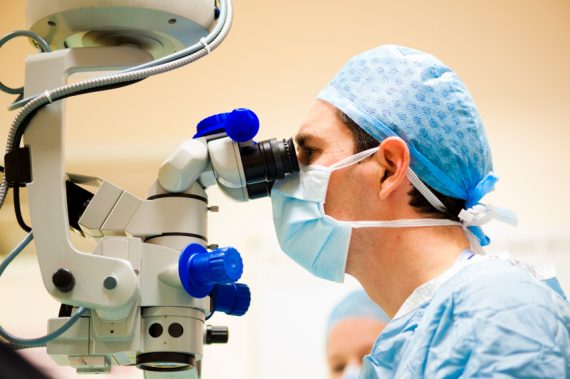Did you know that over half of all Americans over age 80 have a cataract? The condition is very common as you get older, but there are no early symptoms. As the cataract progresses, vision may be blurred and colors may seem faded. You will likely have trouble seeing at night, and you might even have double vision. Many of your friends have likely had cataract surgery, the only way to repair a cataract. If you are wondering, “Are their cataract surgeons near me?”, look no further than the expert surgeons at Elmquist Eye Group.
What are cataracts?
 Around age 40, eye proteins begin to break down, clump together and deposit on the lens. As the clump grows, it forms a cataract on the lens. As time goes by, the cataract clouds more of the lens. Early on, most people don’t notice any symptoms. Instead, they simply experience gradual vision changes, and therefore never suspect a cataract. Over time, as the cataract grows, vision can be blurred and you might start having trouble reading or driving at night.
Around age 40, eye proteins begin to break down, clump together and deposit on the lens. As the clump grows, it forms a cataract on the lens. As time goes by, the cataract clouds more of the lens. Early on, most people don’t notice any symptoms. Instead, they simply experience gradual vision changes, and therefore never suspect a cataract. Over time, as the cataract grows, vision can be blurred and you might start having trouble reading or driving at night.
Frequent symptoms of cataracts are:
- More frequent changes to glasses or contact lens prescription
- Cloudy or blurry vision
- Faded colors
- Trouble seeing at night
- Sensitivity to bright lights (sunlight or headlights)
- Seeing halos around lights
- Double vision
Correcting Cataracts
There are several types of cataracts, but most are age-related. Some cataracts do form after eye surgery, eye injury or as a result of another eye disease like glaucoma. Regardless of the type of cataract you have, surgery is the answer. The good news is that cataract surgery is one of the safest and most effective surgeries performed today.
Left uncorrected, cataracts can lead to vision loss over time. Cataracts can form in one or both eyes, but since cataracts are not a disease, a cataract cannot spread from one eye to the other. By age 80, most people have begun noticing significant cataract symptoms, and this means it is likely time to have surgery.
We use a dilated eye exam to detect cataracts. In fact, it is very important to have at least an annual eye exam as it is the only way to provide early detection of a cataract. Once detected, we can monitor the progression of the cataract. At first, we will likely make more frequent prescription changes to your eyeglasses or contact lenses, but eventually, surgery is necessary. Cataract surgery is a very common procedure in the United States, and we perform it at our state-of-the-art Elmquist outpatient center.
Are You At Risk?
Many older adults wonder about their risk of cataracts. While age is certainly the number one determinant, other health issues and lifestyle choices can speed the progression of a cataract. For example, if you have a family history of cataracts or have diabetes, you may form cataracts earlier in life and they may progress at a faster rate. Likewise, lifestyle choices like smoking, excessive alcohol consumption, steroid use and spending lots of time in the sun can also speed up cataract progression.
Stop wondering and worrying about your risk of cataracts. Come see us today at Elmquist Eye Group at either of our convenient locations in Fort Myers or Cape Coral. Call us today to make an appointment.
